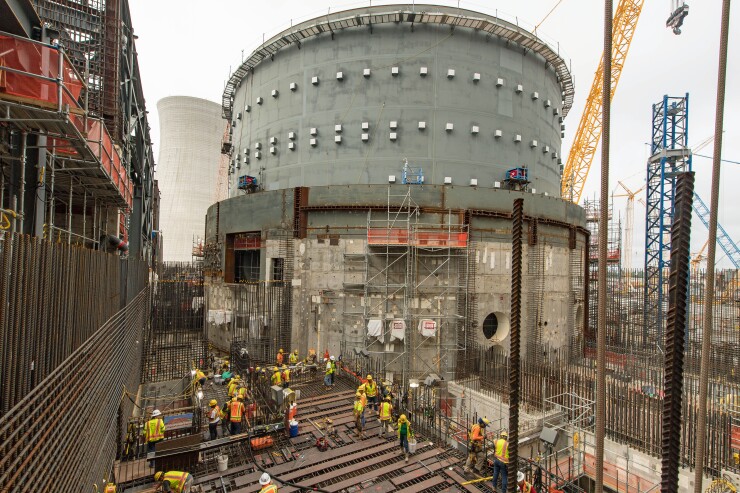A Florida utility’s attempt to repudiate a power purchase agreement for electricity from a troubled Georgia nuclear reactor project could result in a rating downgrade.
JEA, formerly Jacksonville Electric Authority, sued the Municipal Electric Authority of Georgia in an attempt to invalidate a PPA between the two utilities, a move that led S&P Global Ratings to place JEA’s bond ratings on CreditWatch Negative on Friday.

The 20-year PPA requires that JEA pay capital and other expenses as well as a portion of the debt service on $2.9 billion of bonds MEAG issued to finance its 22.7% ownership interest in the two new reactors at Plant Vogtle, and $1.2 billion in loans backed by U.S. Department of Energy guarantees.
The fate of the under-construction Vogtle project remains in doubt amid continued cost overruns.
JEA and the city of Jacksonville filed suit Sept. 11 asking a Florida circuit court to void the PPA, which JEA approved in 2008 and amended in 2014 without getting the consent of the City Council. The complaint also said JEA’s involvement in the contract violated Florida law because the utility has no ownership in the nuclear project.
“In our view, JEA's assertions that its board acted beyond the scope of its authority raises questions about the quality of the utility's internal controls,” said S&P analyst David Bodek. “In our opinion, the utility's legal claims seeking to repudiate the board's actions after a decade call into question the utility's willingness to meet its contractual financial obligations.”
S&P said it also questioned why the city and JEA are now asserting that they have a lack of an ownership interest in the new reactors at Plant Vogtle.
JEA, which has a take-or-pay power purchase agreement with MEAG, is obligated to pay debt service on $1.42 billion of outstanding Project J bonds. The Superior Court of Fulton County, Georgia, validated the debt in 2008.
The lawsuit states that the PPA “purports to saddle JEA and its ratepayers with an unlimited obligation to fund the exorbitant and ever-ballooning cost of constructing units of a nuclear power plant that JEA does not own.”
JEA will be required to pay a portion of a recently announced increase in the cost of building the twin reactors.
Georgia Power Co., the investor-owned utility heading up the project, said that it believes it will cost the four co-owners an estimated $2.2 billion more than previously estimated to complete the project. GPC owns 45.6% of the project, while three public power agencies own the remainder.
In an 8-K report filed with the Securities and Exchange Commission Friday, GPC said its projected share of the total cost increase is approximately $1.1 billion and includes a new contingency estimate of $366 million.
GPC didn’t disclose how much in additional costs will be borne by the three public power owners, although the amount is expected to be shared on a pro rata basis.
Oglethorpe Power owns 30% of the project; MEAG owns 22.7%; and the city of Dalton owns 1.6%. Each pubic power owner will determine their own estimates of the added expenses based on things like new financing and administrative costs.
The new cost estimate will force the co-owners to vote on whether to continue working on the reactors. If 90% or more of the owners vote to cease construction the project will be canceled. A similar project in South Carolina
The project is about 69.9% complete, according to GPC’s
In a separate legal action last week, MEAG filed a lawsuit in federal court claiming JEA breached its contract to buy electricity to be generated by the nuclear project. The complaint requests a declaratory judgment to force JEA to abide by its power purchase agreement.
S&P said Friday that its CreditWatch also reflects the new estimate of the cost to complete the project.
“We view this announcement as another chapter in the projects' recurring cost increases,” Bodek said. “The several and material budget adjustments underscore the uncertain magnitude of JEA's ultimate exposure to Vogtle project costs. We believe the budget adjustments raise questions about project stewardship.”
S&P said it expects to resolve the CreditWatch on JEA after it assesses the co-owners' vote on proceeding with completion of the work at Plant Vogtle.
“We expect the litigation will be protracted and continue well after the vote,” Bodek said. “Nevertheless, we expect that our resolving the CreditWatch placement will consider litigation claims that seek to repudiate board actions and abrogate the contracts.”
JEA is a combined utility that operates in northeast Florida. It has 458,000 electric customers, 341,000 water customers, and 264,000 sewer customers.





